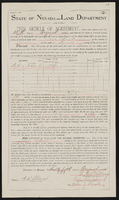Search the Special Collections and Archives Portal
Search Results
Christie Young Papers
Identifier
Abstract
The Christie Young Papers are comprised of Young's personal papers, journals, and photographs between 1982 and 2011. The journals document Young's arrival to Las Vegas, Nevada and her involvement in several nascent Las Vegas lesbian, gay, bisexual, transgender, and queer (LGBTQ) organizations from 1982 to 1985, such as UNLV's Lesbian and Gay Academic Union (LGAU). The collection includes materials related to her life in San Diego, California from 1985 to 1995 and typed transcripts of all journal entries that relate to the Las Vegas LGBTQ community. The collection also includes photographic slides and prints documenting Young's involvement with LGAU and events in the Las Vegas LGBTQ community.
Archival Collection
Sister Klaryta Antoszewska Photograph Collection
Identifier
Abstract
The Sister Klaryta Antoszewska Photograph Collection (1977-1991) consists of photographic slides that depict various Nevada, United States, and international nuclear test protests. The collection includes images of Sister Klaryta Antoszewska and Sister Rosemary Lynch, as well as images of the Lenten Desert Experience and numerous protests at the Nevada Test Site. Also included are images of nuclear testing, soldiers, and anti-nuclear testing promotional materials.
Archival Collection
University of Nevada, Las Vegas Office of the President Records
Identifier
Abstract
The University of Nevada, Las Vegas (UNLV) Office of the President Records is comprised of documents used in daily matters of the Office of the President from approximately 1950 to 2007. The records in the collection document the expansion of the UNLV campus, and the academic and athletics programs offered by the university.
Archival Collection
Michael McKensie Pratt Professional Papers
Identifier
Abstract
The Michael McKensie Pratt Professional Papers (approximately 1950-2021) contain costume designs, musical selections, and synopsis for shows that Pratt worked on in Las Vegas, Nevada including 90 Degrees & Rising, Les Folies Chic, and Jubilee!. The collection also contains souvenir show programs for cabaret shows performed in Paris, France and Las Vegas, Nevada, including
Archival Collection
Yucca Mountain Environmental Safety Reports Collection
Identifier
Abstract
The Yucca Mountain Environmental Safety Collection (1970-2011) consists of reports and impact studies collected by Clark County's Nuclear Waste Division library for documenting Yucca Mountain's potential health and safety risks to Southern Nevada. The reports contain documents pertaining to potential environmental, health, financial, and safety risks from the Yucca Mountain Nuclear Waste Repository, which is located in Nye County, Nevada. The collection contains scientific and social studies in support of and opposition to the site. The bulk of the collection includes licensing reports, site selection studies, and impact studies from transporting, storing, and handling radioactive waste and spent nuclear fuel.
Archival Collection
Ethan Jennings Jr. Architectural Records
Identifier
Abstract
The collection is comprised of architectural drawings (1952-1997) completed by American architect, Ethan Jennings Jr. and/or his architectural firm, Ethan Jennings Jr., AIA, CSI and includes Jenning's work from the firm of John Badgley, AIA, where Ethan Jennings Jr. worked in Southern California during the 1950s, as well as work Jenning's completed with Americo Inc., and Tolosa Group. The collection contains 217 sets of drawings, 6 boxes of project records, and 8 flat files of oversized material from over 200 different projects primarily located in California with some projects located in the Las Vegas area. The materials feature hand-drawn architectural drawings, ranging from preliminary sketches to construction documents. The drawings also contain work from consultants, engineers, and other architects who collaborated on the development of the various projects. The drawings include: commercial, industrial, professional, civic, residential, and religious buildings of varying scales, such as libraries, apartments, warehouses, office developments, schools, military buildings, churches, and custom single-family homes located throughout California and Las Vegas. The drawings also include a number of additions, remodels, and renovations. The collection also contains project records like structural calculations and drawings, project manuals and specifications, bid documents, and professional correspondence.
Archival Collection
Benedict Family Papers
Identifier
Abstract
The Benedict Family Papers materials date from roughly 1905-1998 and are comprised of correspondence and letters (1969-1971) written to Howard Hughes by the public. The collection also contains correspondence written to Robert Maheu, former chief executive of Nevada operations for Howard Hughes. The collection also includes a variety of casino and gambling related product catalogs, gaming guides for Las Vegas casinos, and of research papers and reports primarily relating to sports betting and cheating.
Archival Collection
Tobias Mattstedt Menu Collection
Identifier
Abstract
The Tobias Mattstedt Menu Collection (approximately 1990-2009) is comprised of menus documenting the restaurant industry in Las Vegas, Nevada, the United States, and internationally. The menus include restaurants located in Las Vegas casinos, most notably the MGM Grand, located in Las Vegas. Included in the MGM Grand menus are restaurants such as the Pearl, Tabu Ultra Lounge, and the Grand Wok and Sushi Bar. The collection also documents menus collected by Mattstedt that are not affiliated with the MGM Corporation. These include menus located in the United States, especially Hawaii, including menus from the restaurants Olio!, Nob Hill, Diego's, and Sea Blue. The collection also includes international menus with a focus on Asian countries. The material provides insight into menu design, food culture, and the Las Vegas service industry.
Archival Collection
Stella Champo Iaconis oral history interviews
Identifier
Abstract
Oral history interview with Stella Champo Iaconis conducted by Kay Long on May 14, 1997, May 21, 1997, May 26, 1997, and September 22, 1997 for the Women's Research Institute of Nevada (WRIN) Las Vegas Women Oral History Project. Iaconis opens her interviews discussing her difficult upbringing and life on a ranch in Las Vegas, Nevada with her dad in the 1910s and 1920s. Iaconis then describes her experiences as a waitress in Las Vegas. As the interviews continue, Iaconis discusses Block 16 and sex work, the Helldorado Days, and life in 1930s Las Vegas. Iaconis ends the interview talking about her father and his career as a miner; her many husbands; and her personal history in Las Vegas.
Archival Collection

